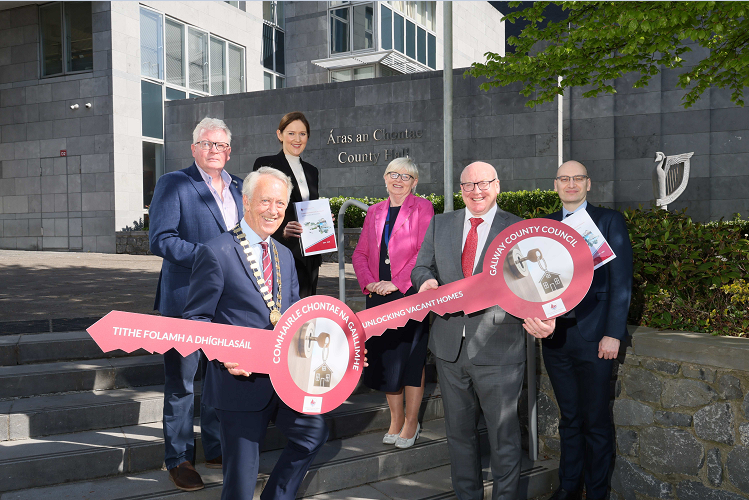Council adopts Action Plan to tackle vacancy rate in County Galway
Mon, 22 Apr 2024 16:24:00 BST
The Vacant Homes Action Plan 2024-2029 features seven key objectives that include bringing vacant and underutilised privately-owned properties back into use and acquiring derelict and vacant brown field sites to convert into residential units to meet social housing demand in key county towns.
The residential vacancy rate in Ireland’s second largest county was the third highest in the country in June 2023 at 6.0%, compared to the national average of 3.9%.
“Galway County has a high demand for housing across all tenures, which is exacerbated by a growing population and wider issues around the affordability and availability of rental and purchase properties,” commented Cllr. Liam Carroll, Cathaoirleach of Galway County Council.
He continued, “The Elected Members fully support the objectives of this high-level strategy document in addressing vacancy and underutilisation of residential properties, thereby increasing the supply of housing in the county.”
Liam Conneally, Chief Executive of Galway County Council said the new plan looks at why private properties become vacant, what advice and assistance is available to the owners of vacant properties, and how Galway County Council uses the range of available schemes and supports to support owners and prospective owners of vacant properties to return the properties to use.
He added, “This action plan aims to provide a targeted approach to identifying vacant housing units with the intention of bringing these properties back into use for both private and social housing. The plan also seeks to promote the development of town and village centres, which can help reduce dereliction and vacancy.”
Galway County Council has committed to implementing a series of targeted actions in the lifetime of the plan including establishing and maintaining a database of vacant properties, reintroducing the Choice Based Letting (CBL) scheme for houses in hard to let locations, and the compulsory purchase of buildings under the Derelict Sites Act and the disposal of derelict social houses that are no longer viable so that they can be brought back into use as private or social housing.
Other actions include working with owners of vacant properties identified in a Vacant Homes Survey conducted by the Local Authority in 2023 with a view to bringing vacant properties back into use, minimising the vacancy level of unfinished housing estates, and increasing participation in the Vacant Property Refurbishment Grants (Croí Cónaithe Scheme), which attracted 364 applications up to the end of the first quarter of 2024.
The Local Authority also has appointed a full-time Vacant Homes Officer to co-ordinate the roll-out of the new plan. Their role includes collecting and monitoring vacancy data and increasing uptake within the local community of various initiatives, schemes, and funding programmes to address vacancy and bring vacant properties back into residential use.
Michael Owens, Director of Services, Housing & Ukrainian Response, said the shortage of housing within the county is affected by the number of applicants (3300) on Galway County Council’s social housing list, an increase in housing support applications being received by the Local Authority, a rental market where demand exceeds supply, and people and families remaining in either rental accommodation or private accommodation that is unsuitable for their needs.
“The provision of housing for those who are unable to do so for themselves is a high priority and a major challenge for Galway County Council,” he added. “The aim is for every household that has a need to be able to access a quality and affordable home that is suited to their needs and is in a secure environment. Bringing vacant homes back into use will assist us in achieving this objective.”
Mr. Owens confirmed that Galway County Council is in consultation with the Department of Housing, Local Government and Heritage to set an annual target for the number of vacant properties to be activated during the lifetime of the new plan.
“This target will include the number of vacant properties to be subject to CPO by Galway County Council, if necessary, to bring them back into use. It is envisaged the target for activation will be several hundred per year,” he concluded.
Prepared by the Housing Department of Galway County Council under the auspices of Pathway 4 of the Government’s Housing for All programme, the Vacant Homes Action Plan 2024-2029 has featured input from the Local Authority’s Planning & Economic Development and Rural & Community Development departments in relation to the activation of vacant properties in the Town & Village Renewal Scheme as well as key criteria in the Urban Regeneration & Development Fund (URDF), Rural Regeneration & Development Fund (RRDF) and the Town Centre First Policy.

Pictured following the adoption of the Vacant Homes Action Plan 2024-2029 (From left to right): Cllr. Joe Byrne, Chair of Housing SPC, Cllr. Liam Carroll, Cathaoirleach, Michelle Connellan, Vacant Homes Officer, Carmel Kilcoyne, Senior Executive Officer, Liam Conneally, Chief Executive, Michael Owens, Director of Services.


Find us
on Facebook
Follow us
on Twitter
Gaeilge
agus Fáilte